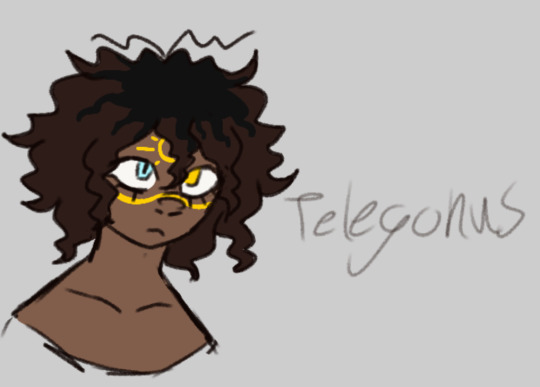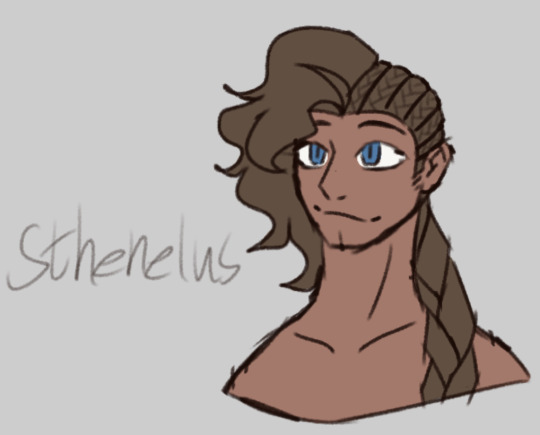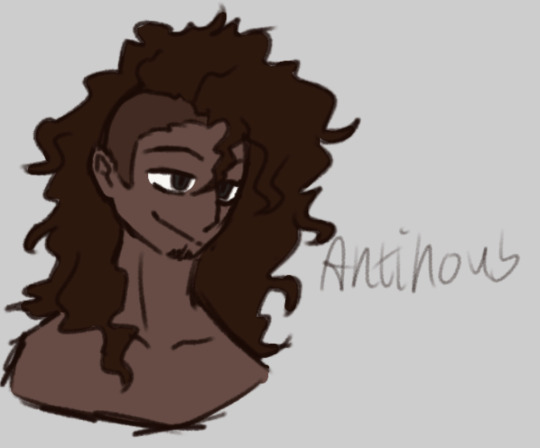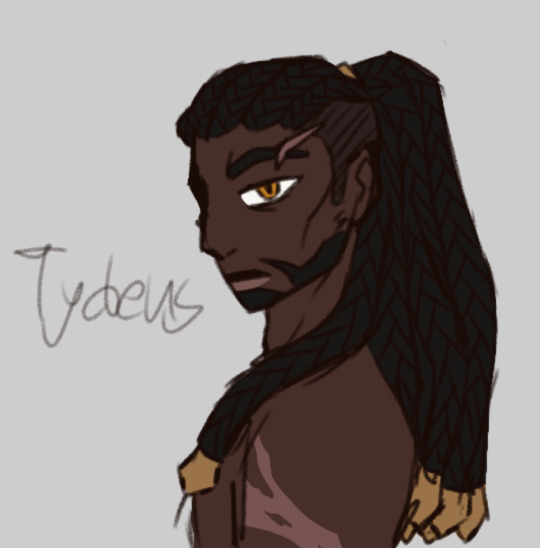#Comaetho
Explore tagged Tumblr posts
Text
you know how people are just amalgamations of traits from their loved ones? yeah i think diomedes got aegialus’s facial expressions. that serious frown that means anything from he’s thinking to he’s trying not to laugh? yeah that’s from aegialus. and i think he talks with his hands when he’s mad because sthenelus does. he’s quick with a comeback because he would watch his sister comaetho absolutely rip anyone who got on her bad side to pieces. he cant take a break to save his life because adrastus never did. he’ll never let anything go because his mom doesn’t. he can’t rest if he hasn’t cleaned and sharpened his weapons before bed because euryalus can’t either. the booming laugh? tydeus. but he’ll never know it.
109 notes
·
View notes
Text






A bunch of men, and Coma
#art#Greek myth art#headshots#sketch#doodle#foodles#Greek mythology#the Iliad#the odyssey#the telegony#Telegonus#sthenelus#Antinous#Odysseus#Tydeus#Comaetho#Telegonus son of Odysseus#in spite of zeus#IsoZ#havoc of the fallen
78 notes
·
View notes
Text
tydeus's family (diomedes got his height from his mother obv)



#fuck it *makes tydeus angst*#tydeus#diomedes#seven against thebes#deipyle#comaetho#diomedes of argos
20 notes
·
View notes
Text
I should post my Comaetho HC shouldn't I
17 notes
·
View notes
Text


Tiny dio being a brat
#he has such a kickable face#god i miss drawing him#doodle#artist on tumblr#art#tagamemnon#diomedes#sthenelus#comaetho#greek heroes#so little so full of live i hope nothing bad happends to him
43 notes
·
View notes
Text
"Amphitryon subjugated all the islands. He slew Comaetho, and sailed with the booty to Thebes, and gave the islands to Heleus and Cephalus; and they founded cities named after themselves and dwelt in them." -Apollodorus, Library

bro, Electryon is dead. an island isn't gonna matter.
i mean i would want one tho.
#greek mythology#ancient greece#ancient greek mythology#perseus#Electryon#Heleus#Amphitryon#Cephalus#Comaetho
9 notes
·
View notes
Text
working on my cousins fic rn and I somehow got to... comaetho x deidamia?
3 notes
·
View notes
Text
i hav so many drawing ideas but the adhd is really adhding :(
#i want 2 draw more argives....#i still need to draw my capa design#n i also wanna do tydeus and deipyle#and diomedes and comaetho#so many ppl to ddraw...#mj.txt
4 notes
·
View notes
Text
transferring some of my thersander headcanons here from discord since i was bugging cygniavenue about the epigoni earlier.
thersander was two years older than diomedes and thus was the same age as comaetho (since she is older than diomedes in my mind).
thersander was very protective of his younger brothers to the point that he prevented them from taking the same oath he took with the other epigoni to avenge their fathers / prevented them from coming along to the second theban war.
he tried his best to speak in the same manner as polynices from the memories he had of his father as a way of keeping him alive for adrastus and timeas.
thersander talked a lot about nothing at all. abhorred the silence. he just kept talking and prying to force people (namely diomedes or his brothers) to engage in conversations and distract him from the negative feelings that fester within him.
thersander was kind of deeply obsessed with diomedes because it made him feel closer to polynices to mirror that "soulmate" dynamic that polynices had with tydeus. their fathers were constantly together in thersander's memories.
thersander looks a lot more like argia rather than polynices, to me.
more to come the more i think about him
6 notes
·
View notes
Text
I actually went and did it and got Comaetho so that's cool I guess
Your gender is now the first randomized wikipedia article you get. No rerolls.
89K notes
·
View notes
Text
thinking about Comaetho. thinking about Aegialus. they could only have been married for like two or three years before he died at Thebes. thinking about Diomedes having to tell his sister that her husband is dead. thinking about pregnant Comaetho at Aegialus's burial, standing between her mother and her brother, utterly lost. she will not raise her own son how their mother raised Diomedes, but she still wants vengeance for her husband.
thinking about Adrastus, who dies after the news that his son is dead reaches him. thinking about their burial mounds being next to each other. even though there is no body in Aegialus's, Adrastus is still buried with his hand reaching out towards his son.
thinking about Aegialia, who lost her other half when her brother went to Thebes. they shared a womb, a birthday, a face. and now she's alone. alone, and being asked to marry Diomedes, a boy who she only ever had thought of as a brother. being asked to rule the city with him (through him - he's too young to know how to be king, but she remembers her father). hating him because he returned from Thebes and Aegialus didn't. hating that she hates him because he's only doing what he's asked.
46 notes
·
View notes
Text
Okay I swear I’m going to bed but first Coma posting cuz I love her, she’s my wife

Full thing will be available here and here soon, trust
#art#Greek myth art#Greek mythology#comaetho#havoc of the fallen#IsoZ-verse#the lore with her goes crazy#I might explain it some day#design#character design
4 notes
·
View notes
Note
TELL ME UR DIOMEDES HEADCANONS ... all of them (also I like your epic trauma studies fics btw)
Hhhhhhmnnnggggg all of them would take soooooo long I am thinking about Diomedes 24/7.
- Comaetho wanted a baby sister and was DEVASTATED when Deipyle and Tydeus were like "here's your brother!" she still complains about it when Dio is especially annoying to her
- the first time he actually heard about what Tydeus did at Thebes (a lot of what he hears is filtered through mentors or his mother), he was 12 or 13 and he threw up.
- speaking about Tydeus eating brains, Diomedes sometimes gets really queasy around raw meat, this mostly goes away after Thebes because he's scene real guts and gore
- as a kid, did NOT understand the concept of tact. He would say anything that comes to mind, the first time he meets the rest of the Epigoni (probably around age 10 or so, he called one of them ugly). He's been beat up enough to develop some sort of filter
More below the cut :))))
- hhhnnngggg he has autism lets just get that out of the way and his special interests are horses and fighting and adrenaline rushes
- when hes not in an adrenaline rush, he gets overstimulated pretty easily but has learned to mask very well
- in Thebes, he truly found himself. He became a man there, which is why he gravitates toward battle
- Every calculated action he makes, he views as an offering to Athena way of showing that he won't disappoint her like his father did
- he loves a hater, loves to be a hater. this is why he gets along with Sthenelus and later Odysseus, aka the biggest haters he knows
- Diomedes LOVES to sleep, it's his favorite hobby.
- he is not a morning person or a night person do not wake him up
- I'm so serious he loves his beauty sleep so much he will sleep 10 hours easy if you let him
- he and Athena dont speak much when it's just the two of them. They gesture and grumble, very rarely do they actually speak.
- scared of a man who has everything to lose (Hector). When people are hopeless they get sloppy but calculated people are so much more deadly
- DESPISES Paris because he's babied by his family, Diomedes was forced by his mother to swear an oath to avenge his father when he was too young to even know what that means, why should Paris be protected? His mistakes got them all here
- I think Diomedes and Antilochus would have been war besties but Antilochus is too loud for him (odysseus talks a lot but is rarely loud)
- after he injuried aphrodite and ares he had a panic attack that Athena would hate him, it took Odysseus and Athena's reassurances to calm him down
- not my hc its from "A Thousand Ships" by Natalie Haynes, but he and Odysseus make faces at each other during war meetings when others aren't looking
- jokes about being odysseus's eromenos, odysseus hates these jokes
- doesnt sleep well post-pallidium
I have more but these are the ones from the top of my head, Im currently writing a Diomedes goes to Ithaca AU fic so I have more but idk which ones I'll use.
77 notes
·
View notes
Text
Freshwater Master List Part 2:
Freshwater fairies live in freshwater and are semi or fully aquatic and do not have fur.
Europe:
Aba (naiad)
Abarbarea (Naiad)
Achelous/ Achlae (Etruscan)
Acis
Acraea (Naiad)
Acragas (mythology)
Aeacus
Aeas (Potamoi)
Aegaeus (Potamoi)
Aegina (Naiad)
Aegle (Naiad)
Aesar (Potamoi)
Aesepides
Aesepus (Potamoi)
Aganippe (Naiad)
Aia (naiad)
Albunea (Pegaeae)
Alcinoe (naiad)
Allikaravitseja (Estonian)
Almo (Potamoi)
Aloja/Dona D'aigua/ Goja/ Paitida - Catalan
Alpheus
Alphesiboea
Amnisiades
Amnisos (Potamoi)
Amphrysus (Potamoi)
Amymone (naiad)
Anapos (Potamoi)
Anauros (Potamoi)
Anchinoe (Naiad)
Anchiroe (Erasinid)
Anchiroe (naiad)
Anguana/ Anguane
Anigrides
Anigros (Potamoi)
Anippe (naiad)
Anthedon (naiad)
Anthracia (naiad)
Apidanus (Potamoi)
Appias (Naiad)
Archidemia (naiad)
Argiope (naiad)
Argyra (naiad)
Arnos (Potamoi)
Ascanius (Potamoi)
Ascra (naiad)
Asopides
Asopis (Naiad)
Asopus (Potamoi)
Asrai
Astakides
Asterion (Potamoi)
Asterionides
Asterodia (naiad)
Astyoche (Naiad)
Axius (Potamoi)
Azyarnitsa
Balamuten/ Balamutnik
Bally Bog
Baphyras (Potamoi)
Batea (naiad)
Bistonis (naiad)
Bolbe (Naiad)
Bolotnik- Slavic
Borda (Italian)
Borysthenes (Potamoi)
Bruxa lavadeira
Brychon (Potamoi)
Byze (naiad)
Byzia (naiad)
Caanthus (Potamoi)
Cacce- haldde
Cacce- jielle
Cacce- jenne
Cacce- olmai
Caicus (Potamoi)
Caliadne (naiad)
Calliphaea (Ionid)
Callirrhoe (Naiad)
Calybe (nymph)
Castalia (Naiad)
Cayster (Potamoi)
Cebren (Potamoi)
Cephissus (Potamoi)
Cleochareia (Naiad)
Chalcis (Naiad)
Chremetes (Potamoi)
Cephisides
Chione (daughter of Callirrhoe)
Chlidanope (naiad)
Cladeus (Potamoi)
Cleide (naiad)
Cleochareia (Naiad)
Cleomede (naiad)
Cleone (Naiad)
Clitumnus (Potamoi)
Clonia (nymph)
Cnossia (naiad)
Cocythiae
Cocytus (Potamoi)
Comaetho (naiad)
Combe (Naiad)
Corcyra (Naiad)
Cratais (Potamoi)
Cretheis (naiad)
Creusa (Naiad)
Crinaeae
Crinisus (Potamoi)
Cutty Dyer
Cyanea (naiad)
Cyane (Naiad)
Cydnos (Potamoi)
Cytheros (Potamoi)
Cyrene (Naiad)
Damocrateia (daughter of Zeus & Aegina)
Danais (naiad)
Daphne (Naiad)
Daulis (naiad)
Deino (naiad)
Deliades
Dercetis (naiad)
Diogeneia (naiad)
Diopatre (Naiad)
Drosera (naiad)
Dziwożona/ Boginka/ Mamuna
Elisson (Potamoi)
Enipeus (Potamoi)
Erasinides
Erasinus (Potamoi)
Eridanus (Potamoi)
Eridanus (Potamoi) (Hyperborea)
Erymanthus (Potamoi)
Euboea (Naiad)
Euippe (daughter of Danaus and the naiad Polyxo)
Eunoë (naiad)
Eupheme (naiad)
Euphrates (Potamoi)
Eurotas (Potamoi)
Eurryroe (naiad)
Eurythemista (nymph)
Evadne (daughter of Poseidon and Pitane)
Evadne (daughter of Strymon and Neaera)
Evenus (Potamoi)
Ežerinis (Lithuanian)
Fae/ Fada- Catalan)/ Faerie/ Faery/ Fairy/ Fee/ Fey/ Doñas de fuera/ Gente Menuda/ Sidheóg/ Slua Sí/ Túathgeinte
Fossegrim/ Strömkarlen (Swedish)
Ganges (Potamoi)
Gatag (Nart)
Gausu māte
Gargaphia (Naiad)
Glashtyn
Glauce (naiad)
Glaucia (naiad)
Gnefro
Granicus (Potamoi)
Grindylow
Groac'h
Gwragedd Annwn
Hagno (naiad)
Haliacmon (Potamoi)
Halys (Potamoi)
Hans Heiling/ Jan Svatoš
Harmonia (nymph)
Harpina (Naiad)
Hebrus (Potamoi)
Hegetoria (naiad)
Heptaporus (Potamoi)
Hercyna (naiad)
Hermus (Potamoi)
Hieromneme (Naiad)
Himalia (Greek)
Himerian Naiads
Hippe (naiad)
Hydaspes (Potamoi)
Hydaspides
Hydriad (Greek)
Hyperia (Naiad)
Idaea (nymph)
Il-Belliegħa (Maltese)
Ilissos (Potamoi)
Imbrasos (Potamoi)
Inachides
Inachus
Indus (Potamoi)
Io (Naiad)
Ionides
Inopos (Potamoi)
Ismenis (naiad)
Ithacian nymphs
Ismene (Naiad)
Ismenus (Potamoi)
Istrus (Potamoi)
Järvevana (Estonian)
Jengk-tongk
Jenny Greenteeth
Kaevukoll (Estonian)
Kropemann
Lady of the Lake/ Lady of Llyn y Fan Fach/ Nelferch
Ladon (Potamoi)
Lamides
Lamos (Potamoi)
Langia (naiad)
Larunda (Naiad)
Laura/ Laurë (Albanian)
Leibethrides
Leimonides
Lelegeides/ Eliyãna
Lethe (naiad)
Libethrias (naiad)
Lietus Māte (Lithuanian)
Lilaea (naiad)
Limnades
Limnaee (naiad)
Linos- https://www.perseus.tufts.edu/hopper/text?doc=Apollod.+3.8.1&fromdoc=Perseus%3Atext%3A1999.01.0022:book=3:chapter=8&highlight=Aegaeon
Liriope (naiad)
Llamhigyn y Dŵr
Loch Ness Monster
Lotis (naiad)
Lúchorpáin
Lycormas (Potamoi)
Maeander (Potamoi)
Maera (Erasinides)
Magea (naiad)
Mahwot
Malis (naiad)
Marabbecca
Maria Enganxa (Aloja)
Marsyas (Potamoi)
Māte
Melanthea (Naiad)
Meles (Potamoi)
Melia (consort of Silenus)
Melite (Erasinides)
Melite (Naiad)
Melusine
Memphis (daughter of Nilus)
Menippe (Thessalian naiad)
Menoetius (Argonaut)
Messeis (naiad)
Metis (naiad)
Metope (river-nymph, the daughter of the river Ladon)
Mħalla (Maltese)
Midea (nymph)
Milichie (naiad)
Mincius (Potamoi)
Minthe (naiad)
Morgen
Moria (naiad)
Mosekonen
Mùmôcz
Mycene (naiad)
Myrtoessa (Naiad)
Mysian Naiads
Nacole (naiad)
Näkki
Naiad
Nais (naiad)
Nana (naiad
Nanny Rutt
Neaera (nymph of Mount Sipylus) (naiad)
Neaera (nymph who became the mother of Aegle by Zeus) (naiad)
Neda (naiad)
Nëczk
Nelly Longarms
Nemea (Naiad)
Nesaea (Nereid)
Nestos (Potamoi)
Nicaea (naiad)
Nilus (Potamoi)
Nixie
Nomia (naiad)
Nonacris (naiad)
Nuckelavee
Numicius (Potamoi)
Nycheia (naiad)
Nymph
Nymphaeus (Potamoi)
Ocyrrhoe (naiad)
Ocyrrhoe (nymph daughter of the river god Imbrasus and Chesias)- https://www.perseus.tufts.edu/hopper/text?doc=Ath.+7.19&fromdoc=Perseus%3Atext%3A2013.01.0003:boo=0:chapter=0&highlight=Ocyrhoe
Ocyrrhoe (nymph of Mysia)
Oenoe (Arcadian nymph)
Oenoe (naiad)
Opis (Nereid)
Ornea (Naiad)
Orontes (Potamoi)
Orseis (naiad)
Ortygia (naiad)
Ortygian nymphs
Pactolides
Pactolus (Potamoi)
Palici
Pallas (Naiad)
Pareia (naiad)
Parthenius (Potamoi)
Pasithea (Athenian Naiad)
Pegaea (Ionid)
Pegaeae
Peg Powler
Peirene (Naiad)
Peneus
Periboea (naiad)
Pero (naiad)
Petra (naiad)
Pharmacea (nymph)
Phasis (Potamoi)
Philodice (naiad)
Phlegethon (Potamoi)
Phoenissa (Naiad)
Phrixa (naiad)
Phyllis (Potamoi)
Pirene (naiad)
Pitane (naiad)
Pleistos (Potamoi)
Polyxo (Naiad of the river Nile)
Porpax (Potamoi)
Potameides/ Potamides
Potamoi/ Amnes/ Flumen/ Flumina
Praxithea (naiad)
Pronoe (nymph mother of the Trojan Lassus)
Prosymna (Naiad)
Psalacantha (naiad)
Psanis (naiad)
Rå
Rhenus Pater
Rhesus (Potamoi)
Rhine (Potamoi)
Rhodius (Potamoi)
Rhyndacides
Rhyndacus (Potamoi)
Rusalki/ Boginki/ Navki/ Vily
Salamis (Naiad)
Salmacis (naiad)
Samia (naiad)
Sangarius (Potamoi)
Satnioeis (Potamoi)
Scamander (god)
Selemnus (Potamoi)
Shellycoat
Shishiga (Russian)
Shahapet (Armenian)
Simoeis (Potamoi)
Sinope (Naiad)
Sithnides (Greek)
Sjörå
Soovana (Estonian)
Sparta (naiad)
Spercheides
Spercheus (Potamoi)
Stilbe (Naiad)
Stima apei (Romanian)
Strophia (naiad)
Strymon (Potamoi)
Strymo (Naiad)
Stygne (daughter of Polyxo)
Svityazianka
Syllis (naiad)
Symaethus (nymph)
Symaethus (Potamoi)
Synallasis (Ionid)
Syrinx (nymph)
Tanagra (Naiad)
Tanais (Potamoi)
Teledice (Greek)
Telete (naiad)
Telphousa (naiad)
Tereine (naiad)
Termessus (Potamoi)
Thalia (nymph daughter of Hephaestus)
Thebe (Naiad)
Theisoa (naiad)
The Nixie of the Mill-Pond
Thermodon (Potamoi)
Thespeia (Naiad)
Thessalids
Thetis/ Thethis (Etruscan)
Thisbe (Greek)
Thronia (naiad)
Thyia (Greek)
Tiasa (naiad)
Tiberinus (Potamoi)
Tiddy Mun
Tigris (Potamoi)
Titaressus (Potamoi)
Tjaetsieålmaj (Sami)
Topielec/ Utopiec
Traîcousse/ Trécouche
Tritonis (Naiad)
Trojan Naiads
Tskarishdida (Georgian)
Ūdens māte
Ulishitsa
Undine
Upes Māte (Lithuanian)
Vættir
Vaks-oza- https://archive.org/stream/mythologyofallra41gray/mythologyofallra41gray_djvu.txt
Vasa (Komi)- https://www.encyclopedia.com/environment/encyclopedias-almanacs-transcripts-and-maps/komi-religion
Vatnavættir
Ved-ava/ Vete-ema/ Veen emo (Russian/ Finnish/ Estonian)
Vedenemä
Vedenemo
Vedenneito
Veehaldjas (Estonian)
Vetevana (Estonian)
Víz Anya (Hungarian)
Vodnik/ Vodyanoy
Vodyanitsa
Water Horse
Water Nymph/ sprite- https://archive.org/details/oxfordbookofstor00harr/page/27/mode/1up
Water Spirit/ He Who Inhabits the Water/ Master of the Water/ Water Dweller/ Water Khan/ Water Man/ Water Master
Xacia
Xana- Asturian mythology
Xanderirhoe (naiad)
Xanino- ditto
Zeuxippe (naiad nymph of Athens)
Zheuzhyk (Belarus
0 notes
Note
I feel like Tydeus was a deceptively good dad. Everyone worries he'd be too rough with a baby and honestly, yeah. But little Diomedes LOVES it. Poor Deipyle is perpetually near a heart attack because every time she turns around Diomedes is being tossed three feet in the air and screaming in delight.
Then even though he did love it Diomedes probably ends up the opposite. Holding the kid like spun glass.
AGREED!
I was recently talking about this somewhere but I love the thought of Tydeus being a really good dad whose constantly worried about his kids getting hurt.
I have so many little snippets of Dad!Tydeus that I have nowhere to post – I adore them so much.
There's one of Tydeus complaining to Deipyle that Diomedes doesn't run to come hug him when he returns to Argos from all the war prep for their marching on Thebes, the way Comaetho does, only to be teased in turn by Deipyle that he needs to wait for Diomedes to grow up, cause he is still only just a toddler (he never gets to see him grow up 💔)
Another of Tydeus constantly running behind Diomedes, terribly afraid he's going to get hurt because Diomedes keeps following the other children, but he's the youngest and he can't keep up with the older children so he keeps falling and Tydeus is terrified he's going to get hurt (so he goes around following him too).
#awkward diomedes with kids is canon#i just know comaetho cracked up laughing when she first gave diomedes his nephew to hold#doomed father-son relationships make me so ill#tydeus#diomedes#my asks
44 notes
·
View notes
Text
Maenadism, Artemis and Dionysus
(Warning: Very long. Sorry.)
This is a topic that has been requested by @aimee-maroux and prompted by this quote by Richard Seaford in "Tragedy, Ritual and Money in Ancient Greece: Selected Essays":
"Maenads leave home where they resist men, become like animals, and perform sacrifice. Hence the frequent association of Artemis with Dionysos. [...] They go rather to reject the men of their own household and polis. Accordingly, the Dionysiac thiasos contains married as well as unmarried women, whose departure disrupts the household in different ways. [...] In the Bacchae, the Theban maenads are compared to fillies that have LEFT the yoke."
There is actually a lot that can be said about this short 5-sentence quote. So much so that we will be focusing on two main points: First, we will address what Seaford refers to when he says "Hence the frequent association of Artemis with Dionysos." and then, I will comment briefly comment on the distinction between literary and cultic maenadism.
Dionysus and Artemis are mythologically and ritually connected, for they share an important common theme: wilderness. The term alone is muli-faceted. It can refer to the wildness of nature, animals and vegetation alike, or it can refer to the wilderness of spirit. Both deities know how to play with the duality of the concept. Because of their respective nature, neither were expected to be predictable. On a symbolic level, there is an union and contrast between the god of vegetal fertility and Artemis' link to virginity.
The city of Patras and human sacrifice
Pausanias tells us of the tale of how the city of Patras came to be freed from performing human sacrifice to Artemis Triklaria. According to him, the ancient custom of human sacrifice itself was a punishment from the goddess in response to the actions of one of her priestesses. The priestess, Comaetho, had made love with her lover in the sanctuary of the goddess. Insulted, Artemis sent pestilence upon the city. The Pythia is then consulted to figure out how to appease Artemis, and she tells them to ritually sacrifice Camaetho and her lover to the goddess and that this sacrifice must be repeated annually with the fairest maiden and young man as victims. A prophecy indicated that the sacrifices would cease when a foreign king would bring with him a strange god. And so, it happened: when Troy was captured and the king Eurypylos recieved as war bounty a chest containing a statue of Dionysus crafted by Hephaestus himself. A statue so powerful that it would drive mad anyone who looked at it, and so it drove Eurpylos mad.
Trying to understand the source of his madness, he consults the Pythia as well, who proceeds to tell him that he will come across a city that performs strange sacrifices, and that this is where he should set down the chest and make his home. And indeed, the winds carried his ship to land in Patras. Upon landing, he comes across the couple that was to being carried to the altar that year and he understood the meaning of the oracle. The people of Patras, also recognizing the events of the prophecy, adopted the cult of of Dionysus (under the title of Aesymnetes) and stopped considered themselves fred from their bloody obligation to Artemis. As for Eurypylos, his madness faded away.
Still according to Pausanias, the cult of Dionysus Aesymnetes and Artemis Triklaria included that a procession of children led by a priest who would go down at night to the Meilichos River wearing wreaths made of ears of corn (not maize, corn as in some type of cereal). The children first wear this wreath of grain, a reminder of the wreath worn by the ancient sacrifical victims, and once they have bathed in the river, they change to wear a wreath of ivy and go to the temple of Dionysus Aesymnetes. This ritual thus symbolizes the city's the liberation from Artemis' punishement.
This ritual has been interpreted in various ways and we unfortunately probably don't know enough about the rest of the festival(s?) to pinpoint the exact meaning of the cult. It does seem that the rites to Artemis Trikalia and Dionysus Aesymnetes were not held simultaneously. We also know that by the second century AD the cult of Artemis Triklaria in Patras was no more. However, what is interesting to keep from this is that Dionysus and Artemis seemed to have been considered as sharing enough common features to be substituted for one another.
There seems to have been other Greek cities where the cult of Artemis and Dionysus where somehow closely linked and suggestions have been made (eg. Dionysus' absence in Sparta might be explained by the fact that Artemis held similar cultic functions), but the evidence is too sparse to make serious claims.
Other notable links
Now that we've seen the biggest chunk, I'll quickly go through some smaller elements:
In the Odyssey, Artemis kills Ariadne "Dionusou marturiêisin" (on the denunciation of Dionysus), which some have interpreted as “on Dionysus' indictment.” If this interpretation is correct, it would highlight Dionysus' and Artemis' role as destructive deities.
The use of masks during the Spartan Ortheia
They are the only Olympians to ever have the epithet "polynumia" (of many names)
A common ability for natural madness.
Maenadism in the Bacchae vs. in cult So, we now have commented one (1) sentence of the original quote. Let's move on to the main topic, that is, maenadism. It's very important to point out what exactly Seaford is commenting on here: he is not making claims based on cultic reality. Rather, he is commenting on maenadism as portrayed in the Bacchae and, by extension, maenadism in the collective imagination of the Athenians.
The reason I'm bringing this up and making the clarification right away is because maenadism has been very discussed and debated, especially when asking the question of "does the Bacchae, and Greek art in general, portray a faithful image of a maenadic ritual?". The general consensus since Henrichs articulated his thoughts about it in the 70s leans more towards the no, in the case of Athens. Maenadic rites were for the most part organized celebrations to which only restricted groups could participate. They more likely belonged to the elite of society.
While the maenads in the Bacchae do reject the men of their households, the sources we have rather seem to indicate that women had to gain their husband's consent to participate in the ritual (as Plutarch tells us with the women of Amphissa). Of course nuance is needed also when handling those sources, which might have also tried to convey the idea that men were still in charge afterall, but it is also not impossible that men considered those rites as a necessity to please Dionysus. What is sure however, is that Greek women who participated in maenadic rites must have greatly enjoyed those short escapes from reality.
Sources: Pausanias, Description of Greece, 7. 19. 1 - 20. 1 (exerpt available on theoi.com) Bremmer J.N., Greek Maenadism Reconsidered, in; Zeitschrift für Papyrologie und Epigraphik, Bd. 55, 1984 Henrichs, A., Greek Maenadism from Olympias to Messalina, in: Harvard Studies in Classical Philology, 82, 121, 1978 Hughes D., Human Sacrifice in Ancient Greece, Routledge, 1991 Rangos, S., Cults of Artemis in Ancient Greece (Doctoral thesis), University of Cambridge, 1996
#artemisdeity#dionysusdeity#artemis*#dionysus*#maenads#maenadism#artemis#dionysus#hellenic polytheism#hellenic paganism#hellenic pagan#hellenismos#hellenic devotion
501 notes
·
View notes